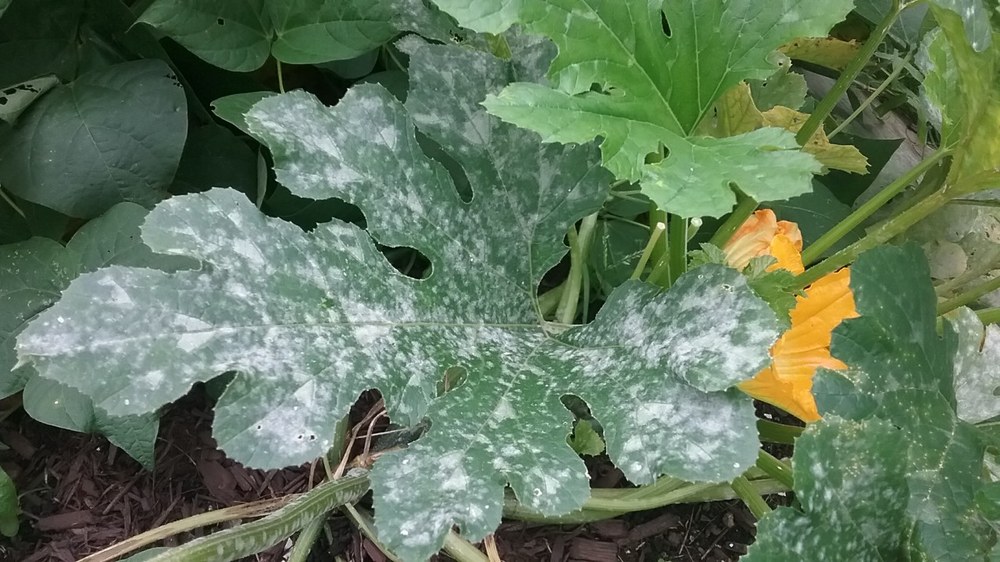The Penn State Extension Master Gardeners of Wyoming County operate an informational email hotline to answer home gardening questions from Wyoming County residents.

Powdery mildew on zucchini plant. Photo credit: Melissa Wright
How to Contact Us
The Garden Hotline in Wyoming County is staffed by Master Gardener volunteers. Please send a detailed description of your gardening question or concern via email to wyomingmg@psu.edu. Please attach two or three high-quality photos to help the Master Gardeners identify the plant or troublesome issue.
Soil Test Kits and Water Test Kits
Soil test kits and water test kits are available at the Penn State Extension office in Wyoming County.
Soil fertility test kits may be purchased at any of the Penn State Extension county offices or from commercial businesses or garden centers that stock kits for the convenience of customers. The Penn State Extension soil test kit consists of a submission form, instructions on how to take a soil sample, a sample collection bag, and a return mailing envelope to mail the sample to the laboratory.
For additional information on Penn State Extension soil fertility testing services, please visit Soil Fertility Testing -- Penn State College of Agricultural Sciences (psu.edu).
Plant Pathology Services
The Plant Disease Clinic is a service and education function of the Department of Plant Pathology and Environmental Microbiology and provides clinical diagnoses of plant diseases for approximately 2,000 samples submitted annually by Pennsylvania agricultural producers and home gardeners.
The Plant Disease Clinic only accepts samples from Pennsylvania.
For specific information on submitting digital photos and physical specimens, including submission forms, please visit Plant Disease Clinic -- Department of Plant Pathology and Environmental Microbiology (psu.edu).
Insect ID Services
Master Gardener volunteers will do their best to identify insect specimens in-house. Otherwise, digital photos of specimens will be sent to Dr. Michael Skvarla at mxs1578@psu.edu. Still photographs are preferred as they have higher resolution than videos. Please include details that will help with the identification, such as where the insect was found (state and city, as well as finer details such as "in my kitchen"), host plant (if it's a plant pest), and the damage caused/what the issue is. Please do not send a blank email with just photographs and no text describing the issue.
Physical specimens
Please include a completed Identification Request Form with all physical samples.
Most physical specimens should be preserved in 70% alcohol (ethanol is preferred, isopropyl/rubbing alcohol is acceptable; both are available at most pharmacies) in a liquid-tight container, such as a small jar. The container should be double bagged in self-sealing plastic bags (such as Ziplock bags) to prevent leakage during shipment and shipped in a box or other rigid container.
Samples that include plant material should be double-bagged and shipped in a box or other rigid container. Do not preserve plant material in alcohol.
Specimens that are shipped in non-rigid containers such as padded envelopes are frequently destroyed during shipping and identification of poorly preserved specimens may not be possible.
Please do not send samples that are removed from the body or contain bodily fluids. The lab is not equipped to handle potentially biohazardous material and such samples will be discarded without being opened.
Physical specimens should be shipped to:
Insect Identification Laboratory
Department of Entomology
501 Agricultural Science & Industries Building
University Park, PA, 16802

